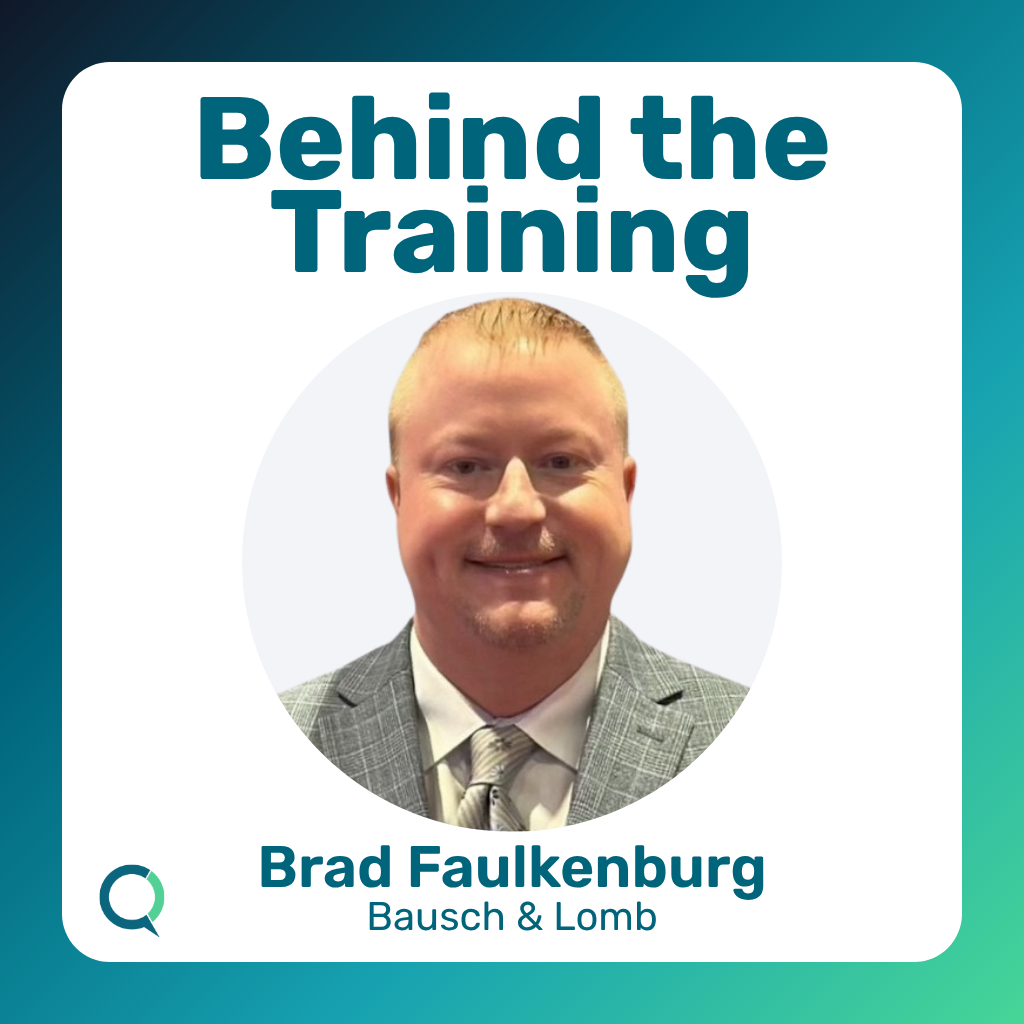Navigating the Future of Pharmaceutical Sales
We kicked off our Behind the Training series with a bang by sitting down with Brad Faulkenburg, Executive Director and Head of US Pharmaceutical Sales and Training at Bausch & Lomb. We explored the evolving landscape of pharmaceutical sales. Brad shared insights on the transformative role of AI, the importance of grit in sales success, and how Bausch & Lomb is adapting its training strategies to meet the demands of a rapidly changing industry.
Q: Brad, your role at Bausch & Lomb seems to cover a lot of ground. Can you give us a sense of what your day-to-day looks like?
Every day is different. Some days I’m focused on strategy, other days it’s about developing our people, and sometimes I’m handling more tactical challenges. I lead our entire US pharmaceutical sales and training organization — roughly 300 to 400 individuals — who are focused on marketing our pharmaceutical RX brands to ophthalmologists and optometrists across the country. At the end of the day, it’s all about delivering value to our customers and, ultimately, improving patient outcomes.
Q: How would you define commercial excellence in today’s pharmaceutical industry?
It’s about having a growth mindset — being better than we were yesterday. Our mantra at Bausch & Lomb is to never settle for good when great is possible. Whether you’re a sales representative in Tulsa or the CEO, the goal is to raise the bar every day. We focus on perseverance and collaboration, both internally and with customers. Ultimately, commercial excellence is about improving patient care through better products and better execution.
Q: Sales models have shifted dramatically in recent years, especially post-COVID. How has that affected your approach to training and customer engagement?
COVID fundamentally changed customer access points. The days of just knocking on doors and walking into an office are fading. Providers are turning to digital channels for information — email, social media, webinars, and even podcasts.
We’ve adapted by meeting customers where they are. That means incorporating AI and other digital tools into our strategy. Face-to-face selling will always matter, but we’ve enhanced our ability to reach and engage customers through a more diversified, omnichannel approach.
Related: Lessons from Training Pharmaceutical Sales Teams: Insights from the Field
Q: AI seems to be playing a big role in that shift. How is Bausch & Lomb using AI in sales and training?
We made a conscious decision to be a leader, not a lagger, when it comes to AI. AI has fundamentally improved our productivity — especially when it comes to data analysis and training.
For example, in the past, a sales rep would have to spend hours analyzing data to understand customer trends. Now, AI tools can generate those insights in seconds. We’ve essentially created a “ChatGPT-like” tool for our reps, allowing them to ask questions like, “What are my top trends?” and get immediate answers.
Q: How has AI changed the way you train your reps?
AI-based training has been a game-changer. Traditional role-playing often comes with emotional baggage — you don’t want to push too hard on a colleague, and there’s a natural tendency to go easy. AI removes that emotional component.
We’ve built AI-driven training that creates a safe space for reps to practice. There’s no judgment. Reps can engage in real-time, simulated conversations, get scored, and improve their skills. And we’ve been intentional about language — we don’t call it “testing” or “assessment.” It’s purely a practice tool. The goal is to make it feel game-like, even fun, so reps lean into it rather than feeling pressured.
Q: Some reps might feel threatened by AI — that it could replace their expertise. How have you managed that resistance?
That’s a real concern, especially among more experienced reps who have been in the industry for 15+ years. We positioned AI as a tool to augment their expertise, not replace it.
We asked them to trust the data for two weeks and see the results. Over time, the reps who embraced AI started seeing better performance, which created a natural buy-in. The key was starting small and showing reps how AI could make them better, not replace them.
Related: Sales Training Redefined with AI
Q: What’s the single most important characteristic of a successful sales rep?
Grit. Talent and intelligence matter, but grit — perseverance, resilience, and drive — separates the good from the great.
We look for candidates who have proven they can overcome challenges. It’s not just about having a successful outcome; it’s about understanding the obstacles they faced and how they responded. You can train someone on products and disease states — but you can’t teach grit. That’s what makes the difference.
Q: How do you assess grit when hiring?
We dig deep. Everyone comes prepared with polished success stories, but we push beyond the surface. We ask about the obstacles they faced — what went wrong and how they responded. If the story sounds too easy, it probably was. We want to know what they did when things got hard. That’s how you spot grit.
Q: Any final advice for companies looking to integrate AI into their sales process?
Don’t shy away from AI — but adopt it at your own pace. Every company will approach it differently. Start small, show measurable success, and let the results speak for themselves.
Three years from now, AI will be table stakes in the industry. If you’re not investing in it now, you’ll be playing catch-up later. The goal is to make your sales force smarter, faster, and more effective — and AI is the key to that.
